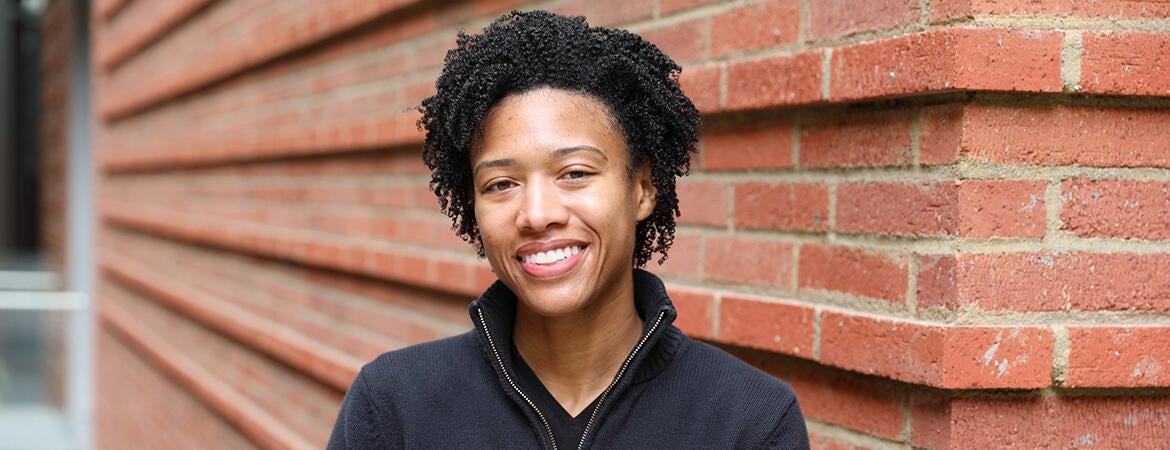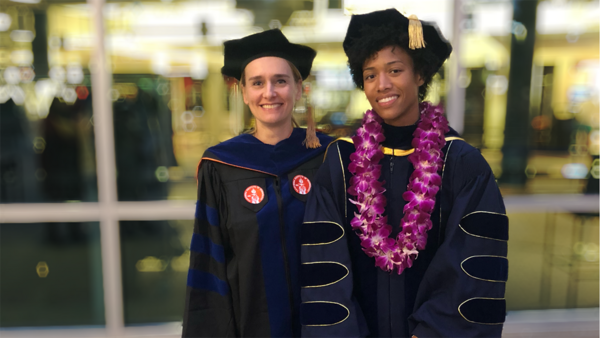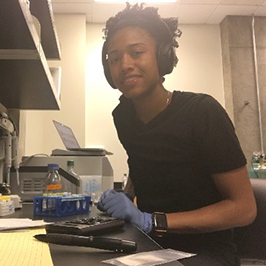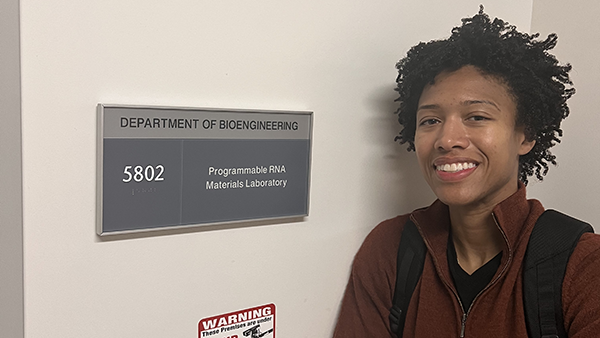
Jaimie Marie Stewart still remembers the stories her grandmother would tell her: stories of growing up in rural Mississippi during the Jim Crow era as a Black woman. Stories of being excluded from educational opportunities and jobs. Stories that made an impression on the young future engineer.
Now, as a Marlan and Rosemary Bourns College of Engineering (BCOE) alum (MS, Bioengineering, ’15; PhD, Bioengineering, ’18) and a researcher dubbed one of the “100 Inspiring Black Scientists in America,” the memories resonate still.
“Hearing about the adversity she faced made me grateful for the opportunities available to me and my ability to pursue higher education,” Stewart said.
Her successes in higher education were made possible through mentorship. Today, she is paying it forward. As an assistant professor at UCLA’s Samueli School of Engineering, her research focuses on developing programmable RNA materials that could one day be used to develop life-saving treatments for diseases and enable breakthroughs in regenerative medicine. As an educator, she also takes on the role of mentor, serving students from underrepresented and underserved communities.
It's a role she takes very seriously.
“I am a big advocate of mentorship because I owe my career trajectory to having great mentors guide me,” she said.
Stewart said she was attracted to bioengineering because of its multidisciplinary nature and its capacity to impact human health.
“I chose to study bioengineering because I wanted to learn more about biology, chemistry, physics, and engineering — but I also wanted to apply my knowledge to solve real-world problems,” she said.
Stewart chose to attend BCOE for her master’s and doctoral degrees because she wanted to take advantage of programs designed to help graduate students access support services and build a sense of community. She was grateful for the many valuable experiences she had with mentors such as Elisa Franco, who was at the time an assistant professor in the Department of Mechanical Engineering.
“She encouraged me to present my work at national and international conferences, as well as network and collaborate with researchers in my field,” Stewart said. “With Professor Franco’s support, I was even fortunate enough to conduct research in Denmark during my PhD."
Franco, now a professor of mechanical and aerospace engineering and bioengineering at UCLA, described Stewart as “an extraordinary graduate student, who wanted to transform the way in which we build materials for biological applications.”
“[Stewart] found RNA to be the ideal component to build materials that can store biological information and communicate with cells, and she quickly became a leading researcher in RNA nanotechnology,” Franco said. “I am thrilled to be her colleague today!”
Stewart said one of her “proudest moments” as a BCOE graduate student was when she was selected to deliver a talk on her research at the International Conference on DNA Computing and Molecular Programming in Germany.
“The conference is highly selective, and being chosen to give a talk, especially as a graduate student, was a great privilege,” she said.
After completing her PhD, Stewart continued her studies as a postdoctoral scholar at Caltech. There she worked on the design, synthesis, and characterization of DNA origami, a technique to fold DNA into tiny nanoscale structures, including miniature biosensors and drug-delivery containers. She also worked on synthetic RNA condensates — compartments of complex mixtures of RNA molecules — for the detection and separation of biomolecules.
While at Caltech, she was named a 2019 Ford Postdoctoral Fellow, a 2019 Kavli Nanoscience Institute Prize Postdoctoral Fellow, and a 2020 Life Sciences Research Foundation Postdoctoral Fellow. She was also recognized as a 2021-2022 Intersections Science Fellow Symposium Fellow and a 2021 Stanford.Berkeley.UCSF Next Generation Faculty Fellow.
During this time, she was named one of “100 inspiring Black scientists in America” in 2020 by Cell Mentor, an online research resource.
“Representation matters, and seeing successful Black scientists and engineers break down stereotypes shows that science, technology, engineering, and mathematics (STEM) fields can be made accessible to everyone, regardless of race or background," Stewart said. “That representation is what inspires students to pursue careers in STEM.
After her research at Caltech, Stewart accepted a position as an assistant professor of bioengineering at the UCLA Samueli School of Engineering, where she continues her work on RNA technologies. She describes RNA as an “exquisite molecule responsible for important biological functions."
“The unique structural and chemical features of RNA allow it to serve as a highly functional molecule,” Stewart said. “Exploiting these features presents us with new ways of interfacing with and understanding biology.”
She shares this passion for bioengineering with students she mentors. In this way, she is continuing the mentorship cycle from which she once benefited as a student and which continues to guide her as a faculty member.
Now heading her own lab, Stewart “aim[s] to create a welcoming and inclusive environment, provide ample research opportunities, and support individual professional development.”
And she continues to fondly recall how her own grandmother served as one of her inspirations to pursue STEM.
“When I was growing up, my grandmother always stressed the importance of education,” Stewart said. “She was raised in rural Mississippi during the Jim Crow era, and faced both racial and gender discrimination as a Black woman. She was systematically excluded from educational and career opportunities.”
“I carry this background and my experiences everywhere I go,” she added. “When I have time to pause and appreciate how far I’ve come, I think to myself: ‘My grandmother would be proud.’”
Header Photo: Jaimie Marie Stewart as an assistant professor of bioengineering at the UCLA Samueli School of Engineering. (Photo courtesy of UCLA Samueli School of Engineering)


